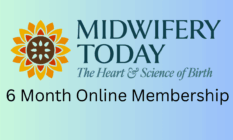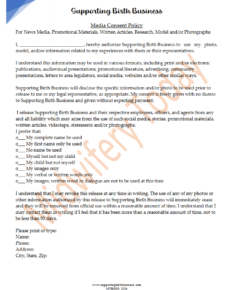
Postpartum: Rebirth of the Woman
Editor’s note: This article first appeared in Midwifery Today, Issue 61, Spring 2002.
Subscribe to Midwifery Today Magazine
When learning the art and science of midwifery, I was blessed to be mentored by the late June Whitson. To this day I am grateful to her for so much. One of her most profound gifts to me was simple: she taught me to appreciate the astounding transformational journey that birth is for the woman. Through her I learned to really appreciate postpartum women, by recognizing how profoundly each had changed from expectant mother to Mother.
When called in the middle of the night for a birth, June would be extra happy if the laboring woman was a primip. One starry night as we crossed the village to attend young Masni in labor, I asked her why she seemed to prefer to attend the births of first-time mothers. Other midwives prefer to help multips who may have shorter, less complicated labors. Her answer has shaped me as a midwife: “Oh, but I love to watch a first-time mother unfold. We must be patient with her, she must go deeper than she ever has before. And she emerges fresh and so transformed. To witness this is for me…well…just wonderful.”
All women who have made the journey into motherhood know that feeling of being forever changed. After becoming a mother, my emotions reached new depths, my heart was more open. I even felt my intellect had expanded. Research has shown us that there is a biochemical explanation for these changes.
In his newest book, Michel Odent speaks passionately of oxytocin, the hormone of love (1). He explains how a birthing woman must release a cocktail of hormones, including oxytocin, endorphins, prolactin, ACTH, catecholomines, etc. (2). Having witnessed many, many times the miracle of pregnancy unfolding into labor and then the astounding advent of a child into the light of our world, I have developed a profound appreciation for oxytocin. The Primal Health Institute’s (3) compilation of research has given me the insight into how experiences that cause us to release oxytocin permanently enrich our ability to give and receive love.
When people sit down to a meal as a family, hold hands, kiss, go for a walk arm-in-arm, make love, pray and yes, when women give birth, oxytocin is released. Each opportunity to experience oxytocin creates receptors, molecules of proteins that on a cellular level are binding sites for this hormone of love. In other words love lays the foundation for more love. Practice makes perfect. And the love hormone is monogamous: In our bodies it looks for and binds with only its own receptors (4).
This explains the profound and permanent transformation from expectant woman into motherhood.
While laboring and giving birth, a woman’s body is flooded with oxytocin, making such a wealth of oxytocin receptors that her capacity to love increases exponentially. Women throughout history have been astounded to find that after having a baby they can and do love everyone more profoundly. This is nothing short of a rebirth. Often new mothers tell me how much more they feel appreciation for life itself. For the postpartum woman, colors seem brighter as their eyes feel more open. Food can taste better. Soft music may sound more soothing. The postpartum woman’s heart can be so open that she cries easily. A mere smile can inspire tears of gratitude. She is also so sensitive that we must protect her tender and true emotions.
Midwives, being the guardians of gentle birth, are the protectors of women’s most significant oxytocin experience. Midwives are the champions of love. Let us also remember to protect the beautiful spiritual bubble that surrounds the newly postpartum woman. New mothers need meaningful, caring contact with their birth attendants. They are tender and extremely open to giving and receiving love. I so enjoy postpartum visits. I know in my heart that they benefit the new mother and her family. What is additionally wonderful is how nourished I feel after spending time with my postpartum mothers.
In the long term, midwives must be open to loving the women they have helped. Childbirth being one’s most significant life passage, those close to us when we open to birth a baby will never be forgotten.
I have long said, “A woman is pregnant for nine months, she is postpartum for the rest of her life.” The biochemical truth of this is good news for the healing of our planet. Postpartum women are a gentle and essential force of nature. They are full of love, and there can never be too much love.
References:
- M. Odent, The Scientification of Love, (Free Association Books Limited, London, 1999) pg 10. ALSO: Pederson C.A. et al. Eds Oxytocin in maternal sexual and social behaviors. Annals of the New York Academy of Sciences 1972; 652.
- M. Odent, The Scientification of Love, (Free Association Books Limited, London, 1999) pg 28
- online at: www.birthworks.org/primalhealth/
- M. Odent, The Scientification of Love, (Free Association Books Limited, London, 1999) pgs 91–94

 Ibu Robin Lim, CPM, had been a midwife for over 20 years when she studied with Debra Pascali-Bonaro to become a DONA Doula. Ibu Robin is the mother of eight and the grandmother of Zhouie, Bodhi, Tashi, Rimba, and Bear. Ibu Robin splits her time between Bumi Sehat Community Health and Birth Center in Bali; the Philippines, where the Bahai Arugaan ni Maria Birth Center Palawan will open in 2019; and Lombok, Indonesia, where Bumi Sehat is operating a disaster relief clinic in tents since the north half of the island was destroyed by earthquakes. “Birth in the Era of Climate Change,” a MEAC-accredited course, is offered by Ibu Robin and Jacquelyn Aurora upon request. Along with The Farm midwife Deborah Flowers, Ibu has developed a website for families called Awakening Birth (
Ibu Robin Lim, CPM, had been a midwife for over 20 years when she studied with Debra Pascali-Bonaro to become a DONA Doula. Ibu Robin is the mother of eight and the grandmother of Zhouie, Bodhi, Tashi, Rimba, and Bear. Ibu Robin splits her time between Bumi Sehat Community Health and Birth Center in Bali; the Philippines, where the Bahai Arugaan ni Maria Birth Center Palawan will open in 2019; and Lombok, Indonesia, where Bumi Sehat is operating a disaster relief clinic in tents since the north half of the island was destroyed by earthquakes. “Birth in the Era of Climate Change,” a MEAC-accredited course, is offered by Ibu Robin and Jacquelyn Aurora upon request. Along with The Farm midwife Deborah Flowers, Ibu has developed a website for families called Awakening Birth (



















